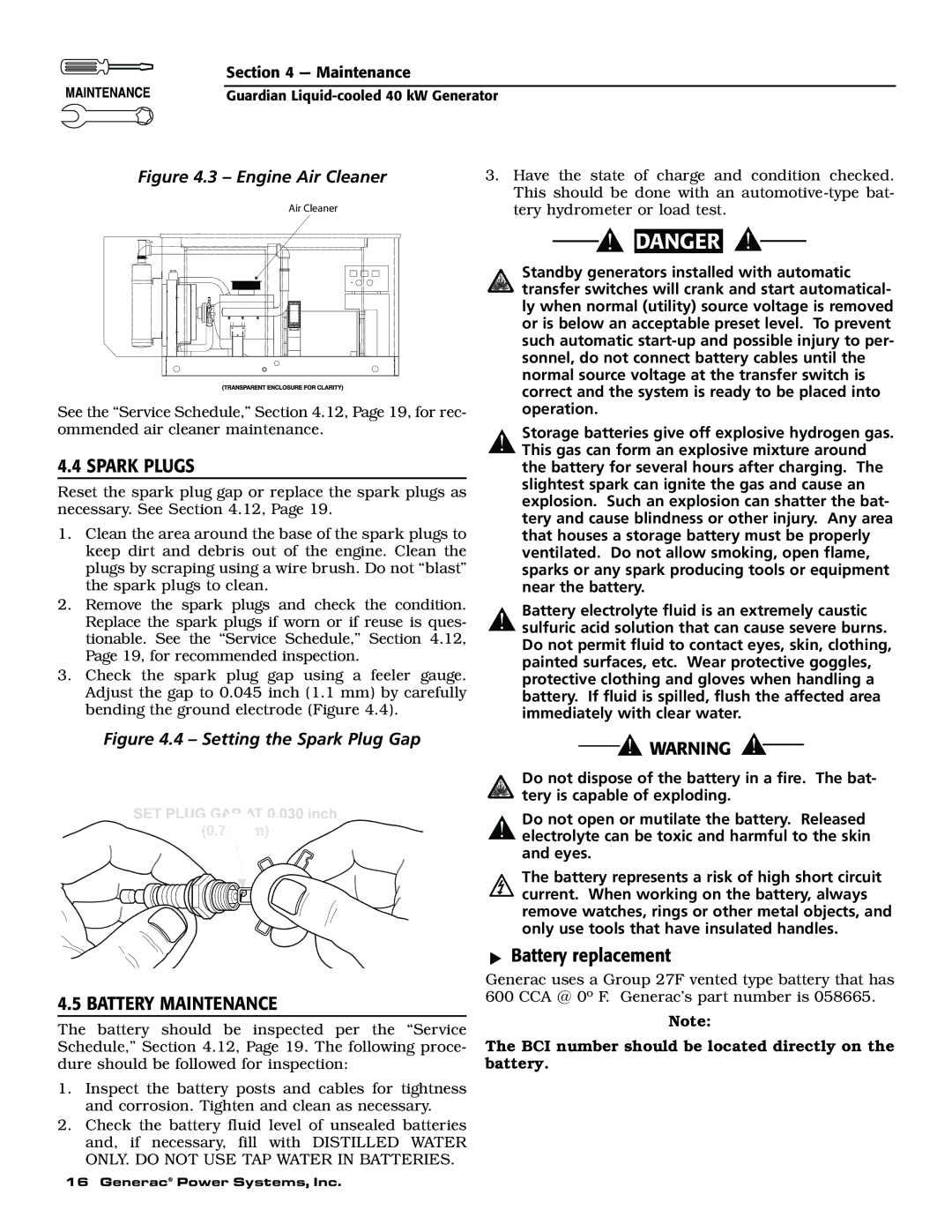
Section 4 — Maintenance
Guardian
Figure 4.3 – Engine Air Cleaner | 3. Have the state of charge and condition checked. |
| This should be done with an |
Air Cleaner | tery hydrometer or load test. |
See the “Service Schedule,” Section 4.12, Page 19, for rec- ommended air cleaner maintenance.
4.4 SPARK PLUGS
Reset the spark plug gap or replace the spark plugs as necessary. See Section 4.12, Page 19.
1.Clean the area around the base of the spark plugs to keep dirt and debris out of the engine. Clean the plugs by scraping using a wire brush. Do not “blast” the spark plugs to clean.
2.Remove the spark plugs and check the condition. Replace the spark plugs if worn or if reuse is ques- tionable. See the “Service Schedule,” Section 4.12, Page 19, for recommended inspection.
3.Check the spark plug gap using a feeler gauge. Adjust the gap to 0.045 inch (1.1 mm) by carefully bending the ground electrode (Figure 4.4).
!
!
DANGER
Standby generators installed with automatic transfer switches will crank and start automatical- ly when normal (utility) source voltage is removed or is below an acceptable preset level. To prevent such automatic
Storage batteries give off explosive hydrogen gas. This gas can form an explosive mixture around the battery for several hours after charging. The slightest spark can ignite the gas and cause an explosion. Such an explosion can shatter the bat- tery and cause blindness or other injury. Any area that houses a storage battery must be properly ventilated. Do not allow smoking, open flame, sparks or any spark producing tools or equipment near the battery.
Battery electrolyte fluid is an extremely caustic sulfuric acid solution that can cause severe burns. Do not permit fluid to contact eyes, skin, clothing, painted surfaces, etc. Wear protective goggles, protective clothing and gloves when handling a battery. If fluid is spilled, flush the affected area immediately with clear water.
Figure 4.4 – Setting the Spark Plug Gap
4.5 BATTERY MAINTENANCE
The battery should be inspected per the “Service Schedule,” Section 4.12, Page 19. The following proce- dure should be followed for inspection:
1.Inspect the battery posts and cables for tightness and corrosion. Tighten and clean as necessary.
2.Check the battery fluid level of unsealed batteries and, if necessary, fill with DISTILLED WATER ONLY. DO NOT USE TAP WATER IN BATTERIES.
16 Generac® Power Systems, Inc.
Do not dispose of the battery in a fire. The bat- tery is capable of exploding.
Do not open or mutilate the battery. Released ! electrolyte can be toxic and harmful to the skin
and eyes.
| The battery represents a risk of high short circuit |
| current. When working on the battery, always |
| remove watches, rings or other metal objects, and |
| only use tools that have insulated handles. |
▼ | Battery replacement |
Generac uses a Group 27F vented type battery that has 600 CCA @ 0º F. Generac’s part number is 058665.
Note:
The BCI number should be located directly on the battery.
